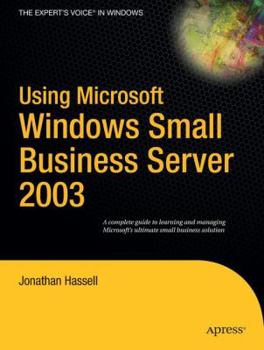Using Microsoft Windows Small Business Server 2003
A server is a computer on a network that manages your files, email, Internet access, and security. Microsoft's Small Business Server is for companies that don't need the larger Windows Server 2003 (Enterprise Edition), which is better suited for large companies. This book will be the fundamental, definitive reference to Microsoft Small Business Server 2003. And the book will appeal to all audiences--from a beginner who has embraced...
Format:Paperback
Language:English
ISBN:B01AIATVOM
ISBN13:9781590594650
Release Date:April 2005
Publisher:Apress
Length:245 Pages
Weight:1.08 lbs.
Dimensions:0.6" x 7.5" x 9.3"
Related Subjects
Client-Server Systems Computer Design Computer Science Computers Computers & Technology Data in the Enterprise Home Computing & How-to Microprocessors & System Design Networking Networks, Protocols & APIs Programming Languages Software Software Design & Engineering Software Design, Testing & Engineering Software DevelopmentCustomer Reviews
3 ratings
Great book for your 1st book on Windows 2003 SBS
Published by Thriftbooks.com User , 18 years ago
I picked this book up because it was cheap, and the only one in the Chapters Book Store I was in that day. But to be honest, I was very surprised and very pleased with the way this book was laid out. If this is your first book on Microsoft Windows 2003 Small Business Server, you will not be sorry you bought it. I think you will find that it will only lite the fire for you to buy more books on SBS 2003, like I did. [...]
Excellent book for someone getting started with SBS
Published by Thriftbooks.com User , 19 years ago
Overall, I'd say that if you haven't read a book on SBS and are fairly new to the SBS 2003 Standard product, that this could be a good first book. If you have some experience under your belt and are using the server product yourself, you might find this to be a little too high an overview to be greatly valuable. I liked this book a LOT more than Brelsford's first book as a primer. The title should be changed to be "Using Microsoft Windows Small Business Server 2003 Standard Edition". There is almost no mention at all of ISA Server 2000 (or 2004 for that matter), and no mention made of SQL Server either. There isn't any effort made to justify an upgrade to Premium. A striking omission in my opinion. Even having worked with SBS for almost 3 years now and having read almost every book on the market on SBS, I can't say I didn't get anything out of this volume, because I did. Some of the things I liked were: the walk through on setting up GPO's, getting PDF's to be indexed, and using FrontPage to customize SharePoint. The book provides an introduction to the software and then walks through the process of installing the software. This is largely explanations of options as opposed to explaining why one option might be better than another. I'm not sure you'd get much out of this chapter that you couldn't get from the help files, which I might add, are very good. Chapter 4 is titled "Exploring Windows Server 2003". And such it is. However, it fails to take into account the limitations of SBS, specifically that there are NO trusts with SBS. The discussion of forests was out of place and didn't even mention this limitation. I got the impression this chapter was lifted wholesale out of another writing and put in here without change. Other than that, it is a good review of file sharing, permissions and Group Policy. Chapter 5 "Exploring Outlook 2003 and Exchange Server 2003" is a brief overview of the Outlook software and Exchange capabilities. There is a segment of the chapter which covers the SBS-specific aspects of Exchange: POP3 connector, Attachment and Content blocking (with a whole table of blocked extensions) and Multiple Stores. In the multiple stores section, the author writes that MS limited the SBS Exchange to 16G. This is not entirely accurate. SBS uses the Standard version of Exchange which has the same limit. It is not SBS specific. However, he discusses how to get around the limit which may be even more useful when Exchange Server SP2 comes out and changes the store size to 75G. Chapter 6 "Windows SharePoint Services Techniques." I really liked this chapter. I thought it was a well rounded overview of some of the capabilities of SharePoint. Integrating it with an Access database, customizing views, using themes, and even modifying the Cascading Style Sheets using FrontPage 2003. He discusses how he uses SharePoint to assist his business processes, mentions another SBSer Chad Gross and his customizations and
still have single point of failure
Published by Thriftbooks.com User , 19 years ago
SBS 2003 is the fourth version of SBS. So in the expected Microsoft pattern, it has numerous refinements over previous versions. For one thing, Hassell describes it as far less likely to crash, or have circumstances which require a reboot. While these two conditions are not the same to an experienced sysadmin, to many users there is no difference. In itself, this enhanced uptime is beneficial in the typical environment in which SBS is run. Namely a small corporate net where there are only a few machines, on which everyone depends for several services. But, as Hassell points out, SBS 2003 still centralises applications on one machine. And these include those accessible from the Internet. Single point of failure. Still, the economic realities of a small company may mean that it cannot easily splurge for extra hardware. You might still wonder, upon reading this book. With all the nice improvements in the applications covered under the SBS umbrella, perhaps it would have been better for Microsoft to not have implemented some of these. Instead, it might have lowered the SBS price more and changed the functionality to let it run across 2 machines. Far more robust.






